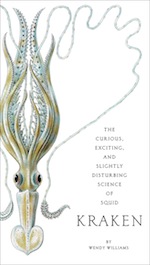When it comes to the stuff of both legends and nightmares, cephalopods – particularly those of prodigious size within the orders that encompass octopi and squid – have historically figured prominently. However when the legends and tales are put aside, the truth pertaining to these little understood creatures is far more marvelous and fascinating than the imaginations of the finest writers of science fiction or fantasy novels could possibly produce. Sadly, too few non-specialists are ever presented with the opportunity to learn the natural histories of these remarkable creatures and thus form for themselves an appreciation of not only how little we truly know about their mysterious existences, but how important they are and will increasingly become to all our lives. To help put this dearth of popular understanding to right, the distinguished science journalist Wendy Williams has written a book that is as delightful to read as it is enlightening: Kraken, the Curious, Exciting, and Slightly Disturbing Science of Squid.
Despite its title, it should be noted that in Kraken, Ms. Williams does not confine her subject solely to the Order Teuthida (the taxonomic classification in which many of the more popularly known squid – such as the Giant Squid, Architeuthis Dux – are grouped) but rather ranges over a large portion of the entire Class Cephalopoda; and it is much to the benefit of the reader that she does. By allowing the subject to be thus expanded, the narrative is allowed to encompass not only the astonishing variety of the ocean’s various species of squid themselves but to interconnect the natural histories of these creatures with their fellow classmates the octopi, cuttlefish, and nautili as well. While such a large topic may be incorrectly assumed to confuse the non-specialist reader, the result is quite the opposite; it fosters a more well-rounded understanding of the cephalopods as a whole through which the reader is better enabled to comprehend the various evolutionary forms they have taken.
And what forms they are. Just stop and consider for a moment the plausibility of a creature with blood based not on iron but copper as as a result being not red but blue, whose brain is not limited to one portion of its body but may be diffused throughout, whose skin is capable of instantaneously changing color to match not only other objects but the very effects of the light shining upon it, and whose level of intelligence in some cases may be only inferior to the few mammals that inhabit its aquatic ecosystem. Were these basic facts alone to be presented by themselves they are sufficient to keep the more imaginative among us intellectually busy for months, if not indeed years, turning over the biological implications of such a creature.
Yet as fascinating as Ms. Williams’ discussions of the respective natural histories of her various cephalopod subjects are, her explanations of just how those who have devoted their careers to understanding these creatures have had to adjust and at times entirely restructure the techniques and methodologies employed in their studies may even surpass them. Presented with a creature so astonishingly different from a human being as a squid or an octopus, how might one go about determining its respective level of intelligence? And what sort of intelligence might once be looking to assess? Human intelligence or cephalopod intelligence? If the latter, just what is a useful scale of cephalopod intelligence – and how might a scientist know it when it is demonstrated? Each question begets more questions. The entire exercise is one that simultaneously confounds and delights the mind, leaving the reader with the overwhelming need at times to simple lean back from the book and recline in the swirling, beautiful fog that can only come from having one’s mind both overwhelmed and illuminated – the intellectual equivalent, as it were, of those fleeting post-coital moments of physical depletion and invigoration. (Yes, the book is that enjoyable.)
To be sure, no collection of writing, however good, is entirely flawless. There are passages where Ms. Williams seems to be following a tangent leading far afield of the book’s stated subject, leaving the reader asking him or herself “where is she going with this?” However trust in the advice of one who having read the book in its entirety can look back upon these passages and see how in retrospect they were absolutely necessary for the development of a later point. Skimming them would most certainly not be advisable, for in so doing one may find oneself presented with a new, mind-bendingly fascinating idea farther along in the text that, had the skimmed information been read more carefully, would have produced the full effect mentioned in the preceding paragraph of this review – an experience of which no one, certainly, would ever inadvertently of through lack of sufficient attention want to deny oneself.
 Book Title: Kraken: The Curious, Exciting, and Slightly Disturbing Science of Squid
Book Title: Kraken: The Curious, Exciting, and Slightly Disturbing Science of Squid
Author: Wendy Williams
Publisher: Abrams
Imprint: Abrams Image
Format: Clothbound
ISBN: 0-8109-8465-2
Published: March 1, 2011
If you enjoyed reading this, please consider signing up for The Well-read Naturalist's newsletter. You'll receive a helpful list of recently published reviews, short essays, and notes about books in your e-mail inbox once each fortnight.
